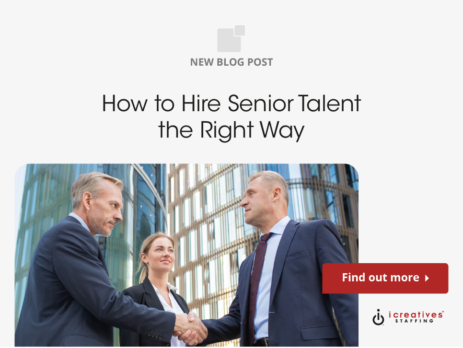How to Hire Senior Talent the Right Way
Hiring senior talent is a critical step for any organization looking to strengthen its leadership and drive strategic growth. The process involves not just identifying individuals with the right skills, but also those who align with the company’s culture and long-term objectives. This introduction explores the nuances of hiring senior talent, emphasizing the importance of a strategic approach to attract and retain top-tier professionals.
Firstly, understanding the specific needs of your organization is crucial. Senior roles require not just technical skills but also leadership qualities and vision. It’s essential to define the role clearly, including expectations, responsibilities, and the impact on the organization. This clarity helps in attracting candidates who are not just capable but also motivated by the role’s challenges and opportunities.
Secondly, the sourcing of candidates must be thoughtful and expansive. Leveraging professional networks, industry contacts, and executive search firms can help uncover candidates who might not be actively seeking new opportunities but are a perfect fit for the role. Social media platforms like LinkedIn and industry-specific forums also play a crucial role in reaching a broader audience.
Thirdly, the selection process should be rigorous and multi-faceted. Incorporating various assessment methods, such as interviews, case studies, and presentations, can provide a comprehensive view of the candidates’ capabilities and their fit with the company culture. It’s also beneficial to involve various stakeholders in the evaluation process to ensure that the candidate aligns with broader organizational values and goals.
Finally, once the right candidate is identified, offering a compelling package is key. This includes not just the salary but also benefits, opportunities for growth, and work-life balance. Ensuring that the offer is competitive and aligns with the candidate’s career aspirations and values is crucial for successful recruitment and long-term retention of senior talent.
Most Asked Questions About Hiring Senior Talent
- What are the key qualities to look for in senior talent?
- How do you effectively assess a senior candidate’s fit with company culture?
- What strategies can be used to attract high-caliber senior candidates?
- How should the interview process be structured for senior roles?
- What are effective negotiation strategies for senior level position offers?
Key Qualities to Look for in Senior Talent
When hiring senior talent, it’s crucial to focus on both tangible and intangible qualities that will contribute to the individual’s success in the role. Experience, leadership skills, and industry knowledge are typically the pillars of a strong senior candidate. However, softer skills such as communication, adaptability, and strategic thinking are equally important.
Experience: Senior candidates should have a proven track record of success in similar roles. This includes not only the duration of their experience but the quality and relevance. A detailed examination of their past roles and achievements can provide insights into their capability to handle the responsibilities of the senior position.
Leadership Skills: Effective leadership is crucial for senior roles. This includes the ability to inspire and motivate a team, make strategic decisions, and navigate complex organizational challenges. Leadership assessments or behavioral interviews can help gauge these skills.
Industry Knowledge: In-depth understanding of the industry’s trends, challenges, and dynamics is essential. Candidates should demonstrate a strong grasp of how the industry operates and how it’s evolving, which will be crucial for strategic planning and innovation.
Communication Skills: The ability to communicate clearly and effectively is vital. This includes not just speaking skills but also the ability to listen, persuade, and negotiate. Role-playing scenarios during interviews can help assess these skills.
Adaptability: The business world is constantly changing, and senior leaders need to be able to adapt their strategies and approaches quickly. Assessing past instances where the candidate has successfully managed change can provide insights into their adaptability.
Strategic Thinking: Senior roles require the ability to see the big picture and plan accordingly. Candidates should be able to articulate their vision for the role and how they plan to achieve it. Strategic thinking can often be assessed through case studies or situational analysis tasks.
Cultural Fit: Aligning with the company’s values and culture is crucial for long-term success. This can be assessed through multiple interactions with various team members during the hiring process.
Problem-Solving Skills: Senior roles often involve tackling complex problems. Candidates should demonstrate a methodical approach to problem-solving, including the ability to analyze data, consider multiple perspectives, and make informed decisions.
Innovation: The ability to drive innovation and think creatively is valuable in senior roles. Candidates should show how they have successfully implemented innovative solutions in their previous positions.
Commitment to Professional Development: A commitment to continuous learning and professional growth is important. Candidates who invest in their professional development show a readiness to adapt and grow with the company.

Assessing a Senior Candidate’s Fit with Company Culture
Assessing a candidate’s fit with your company’s culture is a subtle yet crucial part of the hiring process for senior talent. This alignment influences not only the candidate’s potential success but also their impact on team dynamics and overall organizational morale.
The first step in assessing cultural fit is to have a clear understanding of your company’s values, mission, and work environment. This clarity helps in formulating interview questions and scenarios that reveal how well a candidate’s values and behavior align with the company.
Behavioral interview techniques are particularly effective in this context. Asking candidates to describe past situations where they had to navigate challenges similar to those they might face at your company can provide deep insights into their fit. It’s also helpful to involve various stakeholders in the interview process, as different perspectives can help assess the candidate’s compatibility more effectively.
Another approach is to use psychometric assessments that measure personality traits and values. These tools can provide quantitative data that supports a more subjective assessment based on interviews and interactions.
It’s also beneficial to involve the candidate in informal settings, such as team lunches or group discussions, where they can interact with potential colleagues in a less structured environment. Observing how they communicate and relate to others in these settings can be very telling.
Feedback from these various touchpoints should be compiled and reviewed comprehensively to make an informed decision. It’s important to remember that cultural fit does not mean hiring people who are all the same; diversity in thought and background can enrich a company’s culture and drive innovation.
Ultimately, ensuring a good fit with company culture helps in reducing turnover, enhancing team collaboration, and improving job satisfaction and performance among senior leaders.
Strategies to Attract High-Caliber Senior Candidates
Attracting high-caliber senior candidates requires a multifaceted approach that goes beyond traditional job postings. In today’s competitive job market, companies need to proactively seek out potential candidates and present themselves as desirable places to work.
One effective strategy is to build a strong employer brand. This involves clearly communicating your company’s mission, culture, and values, as well as the opportunities for growth and impact that the role offers. Utilizing social media, company websites, and professional networks to share success stories and employee testimonials can enhance your visibility and attractiveness as an employer.
Networking plays a crucial role in attracting senior talent. Engaging with industry leaders through conferences, seminars, and professional associations can help you connect with potential candidates who may not be actively looking for a new job but are open to the right opportunities.
Executive search firms are often used to recruit senior talent. These firms have the expertise and networks to identify candidates who meet the specific requirements of the role. They can also act as mediators to approach potential candidates discreetly and gauge their interest in the position.
Offering competitive compensation packages is also critical. This includes not only salary but also benefits like bonuses, stock options, and health benefits. Flexibility in work arrangements and opportunities for professional development can also be very appealing to senior candidates.
Lastly, maintaining a swift and respectful hiring process is important. Senior candidates are often involved in their current roles and appreciate a process that respects their time and commitments. Clear communication about the steps involved and regular updates can help keep candidates engaged and interested in the role.
Structuring the Interview Process for Senior Roles
The interview process for senior roles should be structured to provide a deep understanding of the candidate’s capabilities, leadership style, and fit with the company culture. It’s a critical step that requires careful planning and execution.
Initially, a pre-screening interview can be conducted to discuss the candidate’s basic qualifications and career objectives. This can be done via a phone call or a video conference to ensure the candidate meets the basic requirements before proceeding to more time-intensive steps.
Subsequent interviews should be more in-depth and involve various stakeholders, including direct reports, peers in the executive team, and possibly board members. This multi-stakeholder approach helps in assessing the candidate from different perspectives and ensures that they fit well within the team.
Case studies or project-based assignments can be useful in evaluating the candidate’s problem-solving and strategic thinking abilities. These should be closely related to the challenges they will face in the role and provide insight into their approach to real-world business problems.
Behavioral interviews focusing on past experiences and achievements can provide insights into the candidate’s leadership style and ability to handle similar situations in your company. Questions should be structured to elicit detailed responses and examples that demonstrate the candidate’s skills and approach to work.
It can also be beneficial to include a panel interview stage where candidates are asked to present to a group of senior leaders. This allows the candidate to demonstrate their communication skills and ability to interact with multiple stakeholders simultaneously.
Throughout the interview process, it’s important to maintain a balance between assessing the candidate and selling them on the role. Senior candidates are often evaluating the company just as much as they are being evaluated. Therefore, providing them with a positive view of the company’s culture, leadership, and the impact they can have is crucial.
Finally, reference checks should be thorough, involving discussions with former colleagues, supervisors, and direct reports. These references can provide additional insights into the candidate’s work style, achievements, and interpersonal skills.
Negotiation Strategies for Senior Level Position Offers
Negotiating an offer with a senior-level candidate requires a thoughtful approach that balances the interests of both the company and the candidate. Given the level of investment involved in hiring for senior positions, it’s important to get the negotiation right to ensure a mutually beneficial agreement.
Understanding the candidate’s priorities is a crucial first step. This involves not just their salary expectations but also their values, career aspirations, and what they seek in terms of work-life balance. Having a clear understanding of these factors can guide the negotiation process and help in crafting an offer that is attractive to the candidate.
It’s also important to be transparent about what the company can offer. This includes not only the compensation package but also the opportunities for professional growth, the company’s financial health, and future prospects. Providing a comprehensive view can help the candidate make an informed decision.
Flexibility is key in negotiations. While there may be limits to what can be offered in terms of salary, other aspects of the package, such as bonuses, stock options, additional benefits, or even flexible working conditions, can be adjusted to make the offer more appealing.
It’s beneficial to involve senior leadership in the negotiation process, especially when discussions involve elements that may require executive approval or insight. Their involvement can also signal to the candidate the importance of the role and the company’s commitment to ensuring their success.
Finally, it’s crucial to maintain a positive tone throughout the negotiations. Even if disagreements arise, keeping interactions professional and respectful can prevent any negative impact on the potential relationship. Remember, the goal is to build a long-term partnership that benefits both the candidate and the company.
Conclusion
Hiring senior talent is more than just filling a position; it’s about strategically investing in your company’s future leadership and growth. Each step of the process, from defining the role to negotiating the offer, needs to be handled with care and precision to ensure that you attract and secure the best possible candidate for your organization.
Building a strong employer brand and leveraging various sourcing strategies are key to attracting top talent. The interview process should be thorough and involve multiple stakeholders to assess the candidate’s fit with the company culture and leadership team.
Negotiations for senior roles should be approached with a clear understanding of the candidate’s needs and a flexibility to craft an offer that meets those needs while aligning with the company’s capabilities and goals.
Ultimately, the success of hiring senior talent lies in a balanced approach that considers both the needs of the organization and the aspirations of the candidate. By focusing on creating a positive candidate experience and offering roles that are both challenging and rewarding, companies can ensure they attract and retain the leaders who will drive their success in the future.
For more insights on hiring practices, visit our blog on professional profile development and hiring remote illustrators.
In today’s competitive market, finding the right creative and marketing expert can be a challenge. But with icreatives, you’re in experienced hands. With 37 years in staffing and a track record of matching more than 10,000 employees to over 1,000 companies worldwide, we know how to connect you with the best. Plus, you only pay if you hire—there’s no risk, only results. Ready to find your perfect creative or marketing expert? HIRE WITH ICREATIVES today!












